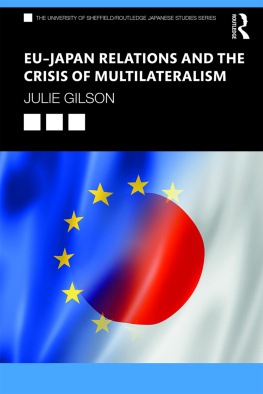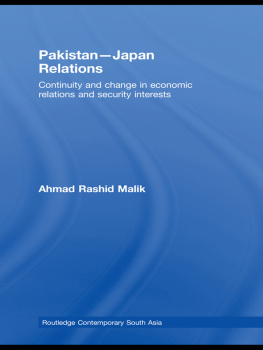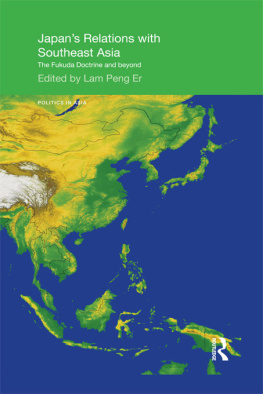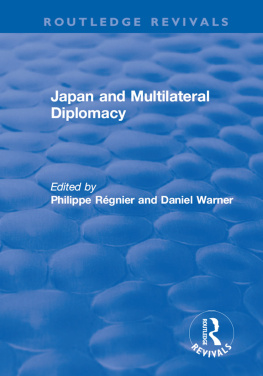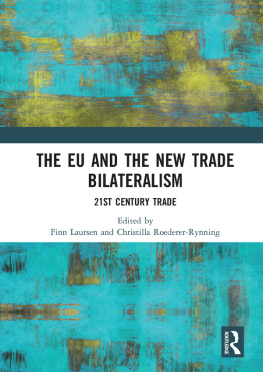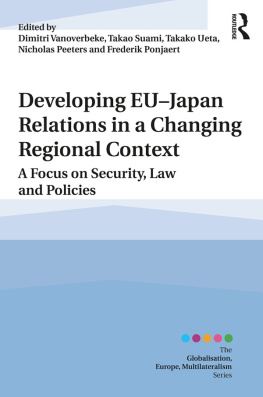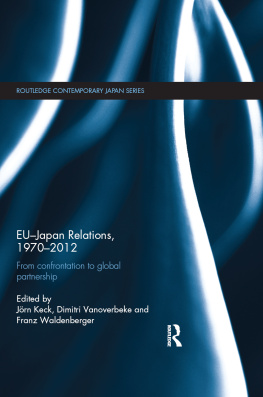EUJapan Relations and the Crisis of Multilateralism
Presenting the history of relations between the European Union and Japan, this book explains the origins and significance of the momentous 2018 Economic Partnership Agreement and its parallel Strategic Partnership Agreement.
Set within the historical context of the 1991 Hague Declaration and Action Plan of 2001, this book analyses the impact of recent background changes to the liberal trading order, the proliferation of free trade agreements, and uncertainty about the role of the United States in the world on relations between Japan and the EU. Adopting a path-dependent approach, it illustrates how these agreements were reached as a result of growing patterns of cooperative behaviour between the EU and Japan, and the imprint of shared past experiences in areas from trade to security. In so doing, this book also raises important questions about the future of multilateral cooperation, exploring the potential for bilateral agreements to undermine the possibility of finding international solutions to increasingly international problems.
EUJapan Relations and the Crisis of Multilateralism will appeal to students and scholars of European and Japanese politics and international relations, as well as policymakers internationally with an interest in these significant agreements.
Julie Gilson is Reader in Asian Studies at the University of Birmingham, UK. Her publications include Japan and the European Union (2000), Asia Meets Europe (2002), and Japans International Relations (2011, co-author).
The University of Sheffield/Routledge Japanese Studies Series
Celebrating 55 Years of Japanese Studies at The University of Sheffield, 19632018
This series, published by Routledge in association with the Centre for Japanese Studies at the University of Sheffield, both makes available original research on a wide range of subjects dealing with Japan and provides introductory overviews of key topics in Japanese Studies.
45. Japans Security Identity
From a peace-state to an international-state
Bhubhindar Singh
46. Nationalism and Power Politics in Japans Relations with China
A neoclassical realist interpretation
Lai Yew Meng
47. Risk and Securitization in Japan
1945-60
Piers Williamson
48. Japans Relations with North Korea and the Recalibration of Risk
Ra Mason
49. The Politics of War Memory in Japan
Progressive civil society groups and contestation of memory of the Asia-Pacific War
Kamila Szczepanska
50. Governing Insecurity in Japan
The domestic discourse and policy response
Edited by Wilhelm Vosse, Reinhard Drifte and Verena Blechinger-Talcott
51. Regional Risk and Security in Japan
Whither the everyday
Glenn D. Hook, Ra Mason and Paul OShea
52. Narrative Management in Corporate Japan
Investor Relations as Pseudo-Reform
Chie Yorozu
53. Hegemony and the USJapan Alliance
Misato Matsuoka
54. EUJapan Relations and the Crisis of Multilateralism
Julie Gilson
For more information about this series, please visit: https://www.routledge.com/asianstudies/series/SE0017
EUJAPAN RELATIONS AND THE CRISIS OF MULTILATERALISM
Julie Gilson
First published 2020
by Routledge
2 Park Square, Milton Park, Abingdon, Oxon OX14 4RN
and by Routledge
52 Vanderbilt Avenue, New York, NY 10017
Routledge is an imprint of the Taylor & Francis Group, an informa business
2020 Julie Gilson
The right of Julie Gilson to be identified as author of this work has been asserted by her in accordance with sections 77 and 78 of the Copyright, Designs and Patents Act 1988.
All rights reserved. No part of this book may be reprinted or reproduced or utilised in any form or by any electronic, mechanical, or other means, now known or hereafter invented, including photocopying and recording, or in any information storage or retrieval system, without permission in writing from the publishers.
Trademark notice: Product or corporate names may be trademarks or registered trademarks, and are used only for identification and explanation without intent to infringe.
British Library Cataloguing-in-Publication Data
A catalogue record for this book is available from the British Library
Library of Congress Cataloging-in-Publication Data
A catalog record has been requested for this book
ISBN: 978-0-367-34094-0 (hbk)
ISBN: 978-0-367-34484-9 (pbk)
ISBN: 978-0-429-32613-4 (ebk)
Typeset in Bembo
by Deanta Global Publishing Services, Chennai, India
For Simon, Lauren, and Sofia, and in loving memory of David and Rosemary Herbert
CONTENTS
Twenty years ago, I wrote a book entitled Japan and the European Union , charting the slow, incremental shaping of a bilateral relationship between Japan and the EU from the 1950s to the end of the 1990s. As its subtitle suggested, that work sought to examine the extent to which Japan and the EU had established a partnership for cooperation into the new century. At first, the shoots of a new relationship did appear to be growing, but during the 2000s many of the pledges made were left unfulfilled and the JapanEU dialogue was largely neglected. In fact, it was only in the 2010s that observers began to see renewed efforts to bolster this important partnership, efforts which culminated in the 2018 agreements. The 2018 Economic Partnership Agreement and Strategic Partnership Agreement signal the potential for a significant advance in cooperation between the EU and Japan, and it is for this reason that I decided to examine relations between them two decades on. I hope that it will highlight the importance of this relationship and the potential it holds, not least for addressing the tremendous challenges we face today, and which call for a new global vision.
I am indebted to many people who helped me to produce this book, and must first of all thank my colleagues in the Department of Political Science and International Studies at the University of Birmingham for enabling me to take the leave needed to write it. A special thanks goes to Tsering Topgyal, for running our Asia-related programmes and events single-handedly. I would also like to thank colleagues working in the small field of JapanEU relations, including my original mentor, Professor Toshiro Tanaka, as well as Yuichi Hosoya, Michito Tsuruoka, and Yukari Akeda, with whom I had many discussions on the topic. Thanks also to excellent comments from anonymous readers, as well as to Reinhard Drifte, and thanks to Nabi Ito for providing research assistance in its production.
These projects never run smoothly without the moral and practical support of friends, and I would like to thank especially Olwen Bryer, Trina and Dave Hibbert, Sam and Ben Myatt, and daily encouragement from Carole Ross. I am also grateful to those who offered me valuable hideaways: Clare May and colleagues in Kenilworth and the Verstraete family in Comblain-la-Tour. I recently found my parents copy of Japan and the European Union , in which I had included a handwritten dedication, and which sat for years, somewhat incongruously, on their living room bookshelves. Despite the fact that they are not here today to see the completion of this new book, it is dedicated to them, for everything they gave me and continue to give me. Above all, my thanks and all my love go to Simon and to our wonderful daughters, Lauren and Sofia.

